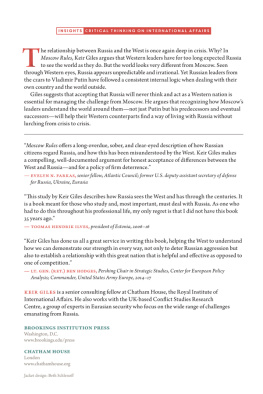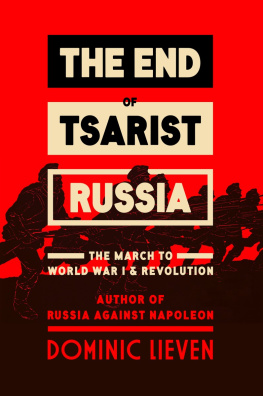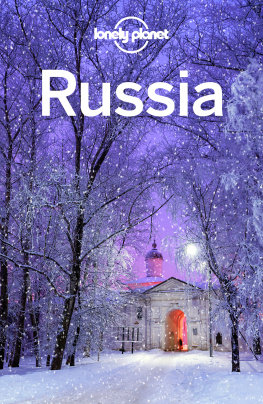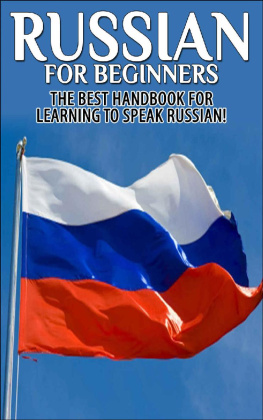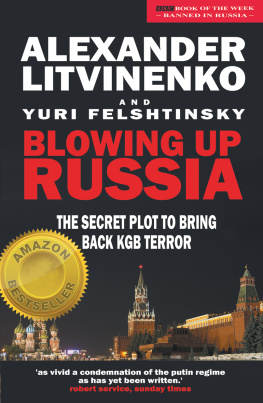Routledge Revivals
Russia Through the Centuries
First Published in 1943 Russia Through the Centuries provides a comprehensive historical background of the U.S.S.R. The book tries to showcase how Russia grew through the centuries, and how the new Russia was a consummation of all that went before. It discusses themes such as the first Russian states and their early struggles; foundations of the Eastern Slav Empire; the reign of Catherine II; Alexander II and the era of reforms; Soviets taking control, and the U.S.S.R. and the Second World War. The author argues that a knowledge of Russian history should be more widespread in England and the former Anglo-Russian understandings were between Courts and the upper circles of society and consequently were not lasting. This book is an essential read for anyone interested in Russian history.
Russia Through the Centuries
The Historical Background of the U.S.S.R.
M. Philips Price
First published in 1943
by George Allen & Unwin Ltd
This edition first published in 2021 by Routledge
2 Park Square, Milton Park, Abingdon, Oxon, OX14 4RN
and by Routledge
605 Third Avenue, New York, NY 10017
Routledge is an imprint of the Taylor & Francis Group, an informa business
M. Philips Price 1943
All rights reserved. No part of this book may be reprinted or reproduced or utilised in any form or by any electronic, mechanical, or other means, now known or hereafter invented, including photocopying and recording, or in any information storage or retrieval system, without permission in writing from the publishers.
Publishers Note
The publisher has gone to great lengths to ensure the quality of this reprint but points out that some imperfections in the original copies may be apparent.
Disclaimer
The publisher has made every effort to trace copyright holders and welcomes correspondence from those they have been unable to contact.
A Library of Congress record exists under LCCN: a 43003066
ISBN: 978-1-032-15156-4(hbk)
ISBN: 978-1-003-24276-5(ebk)
ISBN: 978-1-032-15157-1(pbk)
Book DOI 10.4324/9781003242765
RUSSIA
THROUGH THE CENTURIES
by the same author
THE ECONOMIC PROBLEMS OF EUROPE AMERICA AFTER SIXTY YEARS
RUSSIA
THROUGH THE CENTURIES
The Historical Background of the U.S.S.R.
by
M. PHILIPS PRICE
M.A., F.R.G.S., M.P.
Former Correspondent in Russia of the Manchester Guardian
FIRST PUBLISHED IN 1943
TO MY DAUGHTER
TANIA
THIS BOOK IS PRODUCED IN COMPLETE CONFORMITY WITH THE AUTHORIZED ECONOMY STANDARDS
ALL RIGHTS RESERVED
PRINTED IN GREAT BRITAIN
in 11-point Garamond Type
BY UNWIN BROTHERS LIMITED WOKING
THE comradeship in arms between the British Commonwealth of Nations and the U.S.S.R. has made it imperative that a closer understanding between the two peoples should be achieved. Many years of misunderstanding has made this difficult, but the will to rapprochement is now there, in part at least because of the recognition of the magnificent military achievements of Russia, which have disclosed a virile and creative people who knows what it fights for and loves what it knows.
I am profoundly convinced that the outlook of the Russian and Anglo-Saxon world are not hostile but complementary to each other, and both are rooted in the past. For Soviet Russia is the latest and most logical phase to which all that went before in Russian history was evolving. Conservative opinion in this country is inclined to think that the Russian October Revolution completely broke with the past and destroyed all the good traditions and inheritances of Old Russia. Left Wing opinion on the other hand tends to think also that the break with the past was complete, but that everything in Old Russia was so bad that a clean sweep was made and that the new rgime has inherited nothing from the old. I think both these extreme views wrong, for the truth lies somewhere in the middle. In the following pages I try to show why.
I try to do so by telling the story shortly of the Russian people. At the same time this is not a comprehensive history, but rather an historical sketch in which I try to trace those features in the growth of the Russian State which seem to have been carried down through the centuries and to have been moulded by successive generations into new and more effective forms. I hope then that this short survey of Russian history will tell its own story, and show the Soviets as the latest phase which the political genius of the Russian people has created to meet the needs of the twentieth century.
Throughout these pages I have kept in mind that it is not my business to praise or criticise the form of government in Soviet Russia, any more than I consider it my duty to pass judgment on the institutions of my own country. My sole object is to explain differences and trace historical trends in the two countries and plead for an understanding which will be really lasting this time.
Nor have I given a full or detailed account of the last great Revolution which has given rise to the U.S.S.R. I have thought it best to pick out the principal events to illustrate my theme, which is the continuity of the growth of Russian society and tradition from the days of Vladimir of Kiev, through Peter the Great to Lenin.
The outline of this book was laid down in some lectures which I did in the autumn of 1941 for the Ministry of Information. But I had been thinking out a plan for a short Russian history some time before this. Some years of residence iir Russia before and during the last war gave me an acquaintance of Russia in transition from the old to the new. In 1910 I was a member of a scientific expedition which visited parts of Asiatic Russia, and thus I was able to study at first hand the relations between the Russians of the Tsars Empire and their fellow-citizens of Asia. From 1914-18 I was Manchester Guardian correspondent in Russia, during which time I saw two and a half years of the Tsars rgime in the European provinces and the Caucasus and a year and a half of the Revolution in what was then called Petrograd and Moscow. During that time, and since, I made myself acquainted with the standard works on Russian history, particularly with Kliuchefskys monumental work, the smaller but most valuable history of Platonoff, and last, but not least, the classical work of my friend, Professor Sir Bernard ParesA History of Russia. I also found Masaryks Spirit of Russia useful in following the movements of Russian thought, particularly in the nineteenth century.
The last thing that I claim for this book is that it is a complete history of Russia. But I hope it will be accepted as an attempt to fill a gap in popular thinking about the great and gallant people in Eastern Europe with whom our fortunes are now indissolubly linked.


